- Home
- Tarryn Fisher
The Wrong Family Page 11
The Wrong Family Read online
Page 11
Unsure of what to do, she sat in front of the computer. Her elbow nudged the mouse as she leaned down to massage the last of the tingling from her foot, and a photo of the family on their last vacation materialized on the screen. Winnie studied the photo. Looking at it made her feel more depressed than she ever had in her life. They’d had such a lovely time, hadn’t they? Things had felt right back then, their family structure firm. She’d been happier for sure; and Winnie subscribed to the “happy wife, happy life” theory. You’ve lost yourself, she thought. That trip had been a year ago; maybe what they needed was another holiday. Maybe she was the one who was dragging everyone else down. She would bring it up to Nigel...tomorrow. She could get up early, make him his favorite breakfast, use the latte machine they never had time for, and butter him up. Samuel, she thought, needed his parents on the same team. Suddenly Winnie felt a steely resolve settle in the bottom of her spine and work its way up. She straightened her back to accommodate her new determination. She could and would fix this; the smile was already on her mouth, the type of smile she’d make while reading a nice card.
She reached for her notepad; she could start making plans instead of sitting around being useless. Retrieving a pen from the desk drawer, she pulled her notepad toward her. She wouldn’t have discovered the words etched on the pad if her fingers hadn’t grazed the deep grooves a pen had made in the notepad, a pen struggling to pull ink from its near-empty supply. She lifted the notepad to the dim blue light of the computer and tilted it to make out the words. She could see it had been a list and was about to dismiss it when she realized she could make out a name: Lisa Sharpe. Winnie didn’t know anyone named Lisa Sharpe. In fact, she didn’t know any Lisas at all. There was a longer name printed below that, but she could only make out the first name, Daisy, and part of the last name: Sawat.
She wondered if maybe Samuel had been using this computer. He had his own, but sometimes...
Out of curiosity, Winnie opened a browser on the computer and went to Facebook. Sam had an account—very restricted, everything approved by her. She found the little box where his friends were and typed the name Lisa Sharpe into the search engine. Nada, zilch. Lisa was a name common to Winnie’s generation, not Samuel’s.
She switched on the overhead light and studied the imprint of handwriting on the page. Had she examined it more carefully straightaway, she would have seen right away that it wasn’t Samuel’s.
And then, her fingers pressing compulsively into the little grooves the pen had dug into the paper, Winnie was suddenly sure her husband was cheating on her. Nigel, she thought. Could he...? Winnie spun around in her chair so that it was facing the family room. She was being silly and irrational. Why would she think Nigel was cheating on her just because a woman’s name was written on her notepad? There could be a perfectly good explanation.
She Googled Lisa Sharpe instead. Chewing on her lip, she frowned at the screen, wishing the computer could hurry up and do its work because her stomach was a mess. She thought about going upstairs to find her Tums, but then her computer churned out the results, and Winnie no longer remembered her heartburn because her brain was exploding.
Lisa Sharpe. In the photo, she was wearing a red-striped dress, her blond hair up in a ponytail. She held a ragged-looking Barbie doll up to her face for the picture, head tilted toward the doll, smiling sweetly. She had been two years old, taken from her front yard in 2008. The toddler had been in her swing when her mother stepped inside to get her cell phone. When she returned, no less than sixty seconds later (or so she said), Lisa was gone.
Winnie read through the articles, her confusion mounting—but not nearly as high as her fear. Why would Nigel look up this child? This Lisa Sharpe? She could think of only one reason her husband would be interested in a case like this, and that was something she didn’t want to think about.
Lisa was never found. Twelve years later, and her mother still held Facebook Live vigils for her every Sunday. Winnie stood abruptly, ripping the sheet of paper from the notepad and crumpling it in her fist. No, no, no, she wanted to say, but her tongue was glued to the roof of her mouth, dry and useless. How could he? Or more importantly; why was he? And why now?
15
JUNO
Juno spent the next forty-eight hours confined to the crawl space as the Crouches passed around the stomach flu. It wasn’t the longest she’d been down there, but she was less prepared this time. With Nigel sleeping in the den downstairs, she hadn’t been able to risk sneaking up to replenish her supplies. Her waste bucket was in bad need of emptying, and last she counted, she had just five water bottles leaning against the wall opposite her bed.
The weather dropped to thirty-nine degrees, and all she had left for food was a sleeve of saltines. She’d been careless; her focus—her obsession, she corrected herself—had been finding out the truth about Sam, and in the meantime, she’d forgotten to take care of herself. Again.
Her side was aching, despite the layers she’d put beneath her sleeping bag. She rolled onto her back, groaning. She tried to change her position every twenty minutes; it helped with the pain. Years ago, Juno had a patient with lupus—Cynnie Gerwyn. And who could forget a name like that? But what Juno remembered most about Cynnie was the butterfly mark on her face and the way her thirty-year-old frame was bent and warbled like a wire hanger. She distinctly remembered feeling sorry for the woman. It would be years before Juno was diagnosed herself.
Cynnie had gone on to have a kidney transplant, and Juno had seen her twice weekly after that as she worked her way through a depression brought on by her disease. Back then, Cynnie had been just a client, a woman who paid Juno to listen to her talk, but she’d thought about her more and more since her own diagnosis, wondering what Cynnie had done with her life since the fresh kidney.
Juno moved her hands from where they were pressed between her knees to keep warm and held them close to her face; they were blue. Not from the cold—not yet, anyway. The swollen, blue hands were a sign of her sickness. She bent them at the knuckles and flinched when her joints popped painfully. Juno didn’t have so much as an aspirin down in her cave, not with the entire Crouch family quarantined.
She returned her hands to their place between her knees and wished she were already dead. And she might be by the end of the week: her immune system worked like a bunch of fat old ladies with gout. There was nothing to do but think as she lay underneath the Crouches’ house, below the humming bodies of the family who owned it. She wasn’t ashamed of what she was doing. When it came to survival, in Juno’s opinion, anything was acceptable. She’d watched them, wanted them, and found a home with them.
By the time the Crouches purged the virus and left the Turlin Street house to return to their outside worlds, Juno hadn’t eaten anything in three days. She wasn’t hungry; she wasn’t anything, really—barely existing outside of the pain in her body. She had to talk herself into sitting up, and then slowly she crawled forward, the exertion of leaving her nest enough to leave her gasping for breath. The smell of her body made her gag, and she realized that at some point she’d wet herself, probably in the middle of her pain-hazed sleep. It took her close to an hour to get through the trapdoor where she rested briefly in Hems Corner before hauling herself to her feet.
The house smelled like bleach and flowers. Winnie had done a number with the de-germing. It was terrible, but not as terrible as her own smell, she decided. She very slowly made it to the bathroom to relieve her bladder, and then, stripping off her clothes, Juno walked naked to the washing machine, dumping her things in. She didn’t have the energy to go down for the rest, but there was a new donation bag sitting by the door. She took the first thing she found on top, a shapeless T-shirt and butterfly leggings, and pulled them on. She walked to the kitchen, feeling rather gloomy.
A darkness had settled over her thoughts as she lay in her filth. The past always came to visit when she was too still. She headed f
or the sink where, with no joy, she opened the tap and drank until she was heaving. She didn’t bother with eating yet; her stomach was deciding how it felt about so much water at one time. She had to wash, but washing was a want and eating was a need, so supplies had to come first. Juno paused at the door to the pantry, swaying slightly. She was an impulsive bitch, an irrational bitch, but she wasn’t the type of bitch to make the same mistake twice. Grabbing without thinking, she took as much food as she could carry, armload by armload, until she was weak from the effort. Dumping it all down the trapdoor into the crawl space, she heard the satisfying thuds of cans and bags and even the log of tofu she’d taken from the fridge. Her clothes in the dryer, she headed upstairs to take a bath.
Juno sat in the warm water until it turned cold, and then she filled it up with hot again. When she felt moderately better, she drained the water and clambered out of the tub. She was drying herself very slowly and very carefully when she heard the front door open. Her mouth opened, and she heard the whoosh of air she sucked in. Juno felt cold all over, then her face grew hot.
Red meat or fish, sparkling water or still, gold or platinum—those used to be her everyday options. Today, it was hiding under the bed or hiding in the closet.
She ran for Winnie and Nigel’s bed, a sizable four-poster. She’d planned for this, she was ready. Juno had a viable hiding spot in every room in the house in case something like this ever happened. And it was happening. She could hear fast steps on the stairs. As Juno dove to her stomach, she used her hands and knees to shimmy under the bed, an image of a salamander in her mind. She backed against the far wall and crouched into a ball, as small as she could make herself. She could see the digital clock blinking across the hall from Sam’s nightstand: 1:20. Her body remained silent, thanks to the oxy she’d taken from Nigel’s bottle. Her mind, however, was flicking around like a bad radio connection.
She knew it was Sam before his Vans came into view, knew by the sound of his footsteps. Doom, doom, doom like he carried the weight of his angst in his feet.
But instead of turning into his own room, he abruptly turned into his parents’. Juno saw his Vans up close and personal. Her heart was beating so fast it ached in her chest. How would he react to finding the sweet old lady that he’d chatted with in the park hiding underneath his parents’ bed? God, if she had a heart attack under this bed, how long would it be before they found her congealing on their hardwood? He briefly stopped at the foot of the bed, then turned sharply and made his way to the dresser. Her breaths were shallow, but to her own ears it sounded like the beating of very large wings. A drawer opened. What was he looking for?
And then his phone rang, a little chirping noise she’d heard before.
“Yeah, I can’t find it.”
His voice so loud—so close. She closed her eyes, feeling light-headed.
“My dad has oxy, though...”
No, no, no, Juno thought. She needed that oxy. How many had she stashed away? Sam moved to the bathroom and she heard the medicine cabinet opening, the rattle of those precious, white pills—and then a minute later he was walking back out the door—faster, like he had somewhere to be. The doom, doom, doom went back down the stairs, and then she heard him in the kitchen, the clink of glass and the slam of the front door.
Juno was momentarily stunned, too stunned to move. Had she seen that coming? No. Sam was not supposed to be like his parents; she believed very strongly that nature could overpower nurture and vice versa. He was becoming like them, she decided, crawling from her hiding space and stretching her back with a groan.
She looked toward the bathroom. Padding lightly across the floor, she saw the way she’d left things. Close to the tub, just near the medicine cabinet, was a small patch of wet floor. She pursed her lips at this and then moved her eyes slowly to Sam’s room. He was a teenage boy, and apparently he’d found the fast social connections a couple of oxy could get you; that didn’t mean he knew anything was amiss in his own home. She doubted he’d paused long enough to study the bathroom.
She wondered if he knew anything was amiss with his family—specifically, his own birth. She thought again of his blog: A wolf knows when it’s being raised by bears. But how much did he really know? She found herself wandering back into Winnie and Nigel’s bedroom. Or, as of late, Winnie’s bedroom.
She stood over Winnie’s nightstand, thinking. Remembering the cryptic, depressing journals she’d read, she found herself reaching a gnarled hand toward the handle. She’d been innocently looking for nail clippers when she’d found those journals; she hadn’t even been trying to snoop. But now she had other things on her mind, more sinister things.
And there it was, predictably, in the bottom drawer of her nightstand: a fireproof lockbox. Juno lifted it from the drawer and placed it on her lap. A little key was still attached to the metal hinge of the box, secured by a plastic loop. She had no problem sliding the flimsy key into its equally flimsy lock. If this was the Crouches’ way of protecting their documents...
The lock clicked over, and she opened the lid.
Inside were three stacks of documents, two of them wrapped together with rubber bands. Juno picked those up first, unwrapping them with renewed speed. The shadows outside were shifting, the light in the bedroom turning from yellow to orange as the sun dipped into the park. She studied the shadows on the bedroom wall for a moment and then turned back to her task. She was nervous.
Passports: hers and Nigel’s. Sam’s was not among them. Rewrapping the passports, Juno put them back as she found them and reached for the next, larger stack of documents. It was exactly what she’d been hoping to find—in a plastic sleeve were Winnie’s and Nigel’s birth certificates, Social Security cards, marriage license, and life insurance policies. Juno took everything out of the sleeve and then put everything back, one by one, just to make sure. There was no birth certificate for Sam, no Social Security card. That was odd. It was possible that Winnie kept it somewhere else, but Juno couldn’t imagine why. It was as if he simply didn’t have any documents. She knew she was jumping to conclusions, but what she’d been hoping to see was a birth certificate that would settle the matter and quiet the nagging voice in her head. She remembered Sam’s words that day in the park, the day he said he didn’t feel like he was their kid—“I looked for my birth certificate once. My mom said it was ruined in storage when all the things got covered in mold and they hadn’t gotten around to applying for another one.”
Juno had seen plenty of women come through her office who were just like Winnie. They were predictable in their order: Winnie wrote Samuel’s name in Sharpie on the labels of his clothes, she balanced his meals with the precision of a nutritionist, and his Halloween costumes had been handmade his entire life—there was an entire album of photos to prove it. This was not the type of mother who lost or forgot to apply for her child’s birth certificate; quite the contrary. Juno lifted her hand to the smooth patch of flesh behind her ear.
If Sam didn’t have medical records, he wouldn’t be allowed to attend public school. Right? Right.
Maybe Winnie knew Sam’s birth mother and had manipulated her into giving away her baby. To Juno, that would explain Nigel’s outburst. She was grasping, and a headache had eased its way into the back of her head and was moving toward her forehead in a crawl.
On to the last item in the box—it was rolled and wrapped with rubber bands like a fat joint. It took Juno a good three minutes to get them off, and it only occurred to her after that she wouldn’t be able to replicate the complicated wrapping system. “Is there method to this madness, Winnie?” she asked the room.
It was too late now...two envelopes unfolded in her hands, the paper crackling from age. It was like one of those Russian nesting dolls, she thought; things inside of things. That told her a little bit more about Winnie. She set the rubber bands aside and stared. Instead of licking the strip, Winnie had tucked the flap inside and then
rolled the envelope up, binding it over and over. Juno had the feeling that she’d open it and there’d be nothing in the interior. Wouldn’t that be hilarious, she thought. But it wouldn’t be. Juno was already on edge, digging around where she shouldn’t be. And what did she care, anyway? Why was she digging around—these people were not her problem. Juno had come here to retire, to die. She told herself it was curiosity, crumbs left behind from her former trade, as she tented the opening of the envelope. It was empty aside from another rolled piece of paper, this one thin enough that at first Juno thought it was a hand-rolled cigarette. She had to use her fingernails to unroll it, being careful not to rip the paper. She spread it out on her knee and saw that there were two printouts, the writing so faded and grainy she could barely make out what they said without glasses. They looked to Juno like police reports. She’d seen a few in her line of work. The words were a series of blurred black lines. Sometimes she used Nigel’s reading glasses, which he kept in the side table next to his bed. Juno stood, padding lightly over to Nigel’s nightstand, and slid the drawer open. They were there next to a bottle half-full of cough syrup. She slipped the glasses on and reached for the syrup, screwing off the lid even as she eyed the abandoned papers where they lay on Winnie’s coverlet. She eyed them long and hard as she took a generous swig, the tomato red of the syrup coating the inside of her mouth like cool cherry blood. Licking her lips, she put the bottle back in the drawer and moved to Winnie’s side of the bed. The words on the papers were easier to see now. Juno held one of them in front of her face. Her tongue made a strange clicking sound as she read, the words becoming increasingly more disturbing. Juno realized she was clicking her tongue at Winnie. Finally, folding the papers neatly, she tucked them into her pocket. She stared once more into the envelope.

 Jackal
Jackal F*ck Love
F*ck Love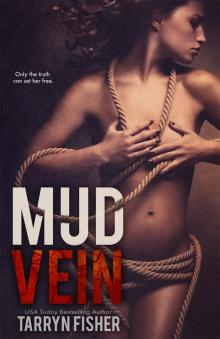 Mud Vein
Mud Vein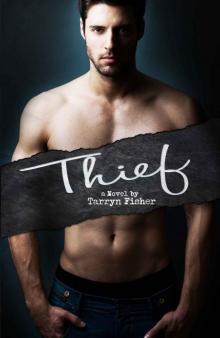 Thief
Thief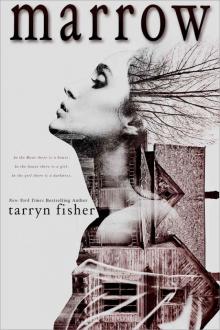 Marrow
Marrow Dirty Red
Dirty Red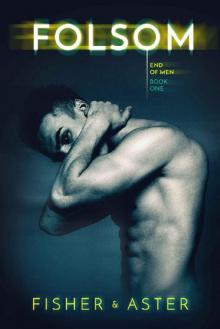 Folsom
Folsom The Opportunist
The Opportunist Atheists Who Kneel and Pray
Atheists Who Kneel and Pray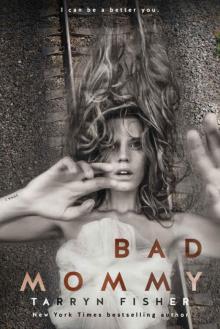 Bad Mommy
Bad Mommy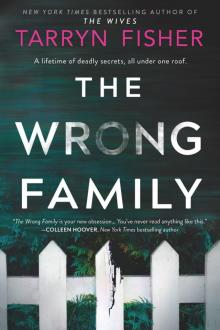 The Wrong Family
The Wrong Family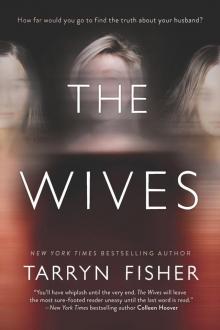 The Wives
The Wives Jackal (The End of Men Book 2)
Jackal (The End of Men Book 2)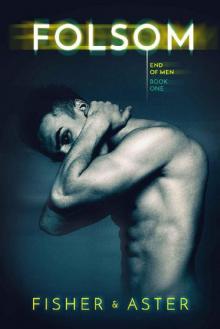 Folsom (The End of Men Book 1)
Folsom (The End of Men Book 1)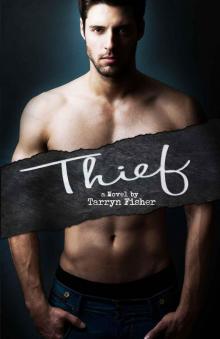 Thief (Love Me With Lies #3)
Thief (Love Me With Lies #3)